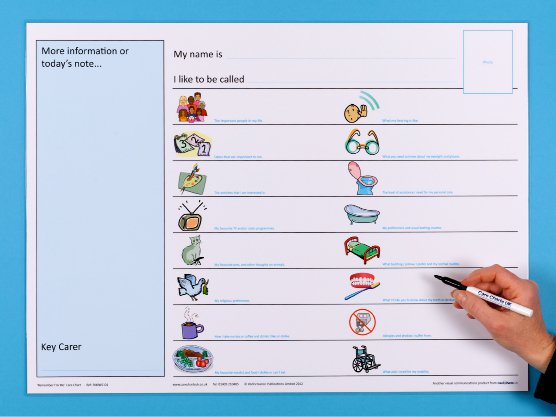 These award-winning Charts were developed by a family carer in 2010, concerned that paid carers knew nothing about her husband, who was living with advanced dementia when he moved to a care home.
These award-winning Charts were developed by a family carer in 2010, concerned that paid carers knew nothing about her husband, who was living with advanced dementia when he moved to a care home.After the manager asked for more of the wall charts to help with the care of their other residents, Zoe Harris went on to offer it to other care homes, developing a range of designs to meet the needs of different environments. Various versions are now in use in over 900 care homes and some 30 community, general and acute hospitals.
All the wall charts have 18 symbols with room next to each to write in a person’s needs and preferences, and a laminated surface so the information can be updated as often as required. The principle behind the chart is very simple: you cannot provide dignified and person-centred care if you know nothing about the person.
 Zoe recognised this when she saw her husband being offered cups of milky tea, despite it being noted in his care plan that he preferred his tea black. “It was clear that they did not have time to read the care plan,” Zoe explains, “and when your quality of life is so reduced, something as simple as getting a hot drink the way you prefer it becomes a big deal.” What instigated the first chart was something potentially more serious. “Geoff developed a tendency to tip his chair over backwards,” says Zoe, “so the staff knew it was important to push his chair up against a wall. That worked until a bank staff member came on duty and wasn’t told. That day I got a phone call to say that Geoff had had a fall.”
Zoe recognised this when she saw her husband being offered cups of milky tea, despite it being noted in his care plan that he preferred his tea black. “It was clear that they did not have time to read the care plan,” Zoe explains, “and when your quality of life is so reduced, something as simple as getting a hot drink the way you prefer it becomes a big deal.” What instigated the first chart was something potentially more serious. “Geoff developed a tendency to tip his chair over backwards,” says Zoe, “so the staff knew it was important to push his chair up against a wall. That worked until a bank staff member came on duty and wasn’t told. That day I got a phone call to say that Geoff had had a fall.”Gradually, the regular staff got to know Geoff and the things that mattered to him, but the chart continued to play a role, allowing carers and Zoe to swap messages, giving new staff a snap shot of the things that mattered to Geoff, and ensuring that everyone was aware when things changed, such as mobility issues or personal care. The need for a tool like Care Charts is just as great in hospitals. “It can be a traumatic experience for someone with dementia to spend time in hospital” says Zoe, “and the mistakes that occur when the staff know nothing about a person can have long term, sometimes permanent negative effects. Whilst attempts are often made to collect information, there is rarely a solution found to make it available to all staff.
A Care Chart can resolve that problem. Feedback from some of the organisations that have adopted Care Charts: Peninsula Community Trust: “The Twist-N-View Care Charts helped us reduce our average length of stay for dementia patients.” Epsom Hospital: “I couldn’t possibly have hoped for a better result.” Furze Hill House: “…an indispensable part of our holistic care for residents…” Amy Woodgate House: “… they help our carers enable our residents to achieve maximum quality of life.”
In 2014 Zoe Harris was included in HSJ's list of Innovators and named as one of Nesta /The Observer's 50 New Radicals.
